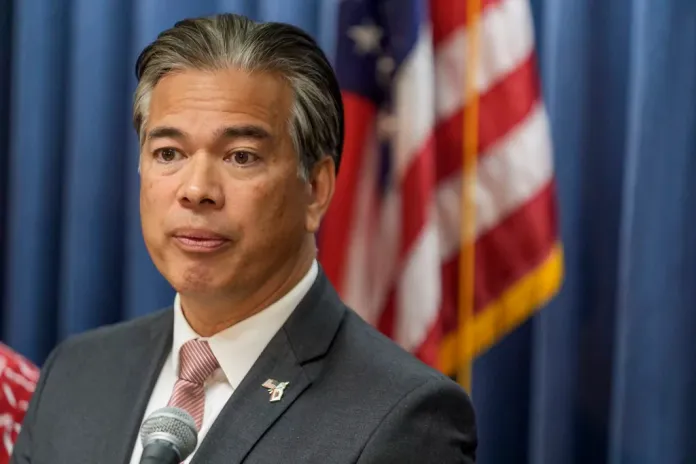The federal government shutdown is holding up rulings in some of the nation’s most significant policy disputes between Democratic-led states like California and the Trump administration.
Just days before the Justice Department was supposed to file its response to a lawsuit by California Attorney General Rob Bonta and 14 other states challenging the government’s restrictions on gender-affirming care for transgender and nonbinary youth, it asked a federal judge to halt the proceedings temporarily.

They argued that the shutdown prevented lawyers from working on the case.
“Department of Justice attorneys and employees of the federal defendants are prohibited from working, even on a voluntary basis, except in very limited circumstances, including ‘emergencies involving the safety of human life or the protection of property,’” the DOJ wrote in its Oct. 1 filing. Oct. 1 was the first day of the shutdown.
The judge presiding over the case agreed and granted the request.
Some federal employees, including air traffic controllers, have stayed on the job, working without pay, while thousands of others have been furloughed. The DOJ has not said which of its attorneys have been sidelined by the shutdown, but noted that several have. Federal cases can take years to resolve, but an extended shutdown could exacerbate delays, leaving key public health matters in limbo.
Bonta argued that Trump’s order to pull federal funding from medical institutions that provide gender-affirming care for transgender and nonbinary youth could have devastating effects.
“The result is an atmosphere of fear and intimidation experienced by transgender individuals, their families and caregivers, and the medical professionals who seek only to provide necessary, lawful care to their patients,” Bonta, along with the other attorneys general, wrote in the suit.
The same day the Justice Department was granted a pause in the transgender care case, DOJ attorneys were granted another pause in a case where California, Massachusetts, and other states challenged the mass firings at the Department of Education.
Justice Department lawyers again argued that department funding had been suspended during the shutdown, and they were not sure when Congress would restore it. In a district court in California, the DOJ asked for another pause in a lawsuit that it brought against the state, challenging California’s refusal to hand over its voter registration rolls. The government has filed similar motions in Minnesota in a case contesting state education funding for illegal immigrants and one in Rhode Island over funding for victims of domestic violence.
While court-ordered pauses don’t usually create immediate emergencies, a prolonged shutdown could pressure some litigants — especially those relying on federal funding — to settle.
“The federal courts are heavily overloaded as it is, so the judges are not going to have any difficulty finding other things to do with their time,” David Super, a law professor at Georgetown University, told the New York Times. “But at some point, having issues tied up in litigation indefinitely is going to slow everything down.”
Bonta and other attorneys general have selectively opposed the Justice Department’s requests to pause cases, generally allowing those that work in their states’ favor to proceed.
They recently challenged a request to pause a case in which California and several other states sued to block the administration’s move to defund Planned Parenthood. The government once again cited a lack of staff during the shutdown as the reason for the delay. But Bonta noted that the Department of Health and Human Services had continued efforts to cut funding despite the shutdown, arguing that residents faced an imminent risk of losing access to healthcare.
“The risks of irreparable harms are especially high because it is unclear how long the lapse in appropriations will continue, meaning relief may not be available for months at which point numerous health centers will likely be forced to close due to a lack of funds,” the states argued.
On Oct. 8, U.S. District Judge Indira Talwani denied the government’s request for a pause.
California has filed more than 40 lawsuits against the Trump administration that have ranged from seeking to restore $168 billion in federal funding to birthright citizenship.
JUDGE HALTS TRUMP’S FEDERAL WORKER LAYOFFS DURING GOVERNMENT SHUTDOWN
Almost all of the lawsuits are filed in concert with dozens of other Democratic-led states and argue that the president and his administration’s actions are unconstitutional and exceed the powers permitted under law. Some lawsuits argue the administration bypassed required procedures when altering policies, violating the Administrative Procedure Act. In multiple instances, courts have ruled in favor of the states and ordered compliance.
Ahead of his second term, California earmarked tens of millions to fight Trump and started preparing legal briefs before he took office as the 47th president. The state has since nearly doubled the rate of lawsuits compared with his first term, filing 41 cases by the start of the government shutdown.
